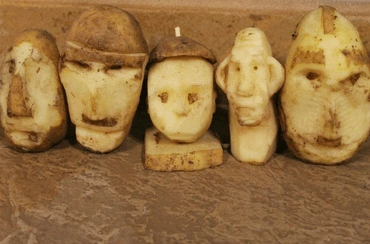1
The vision of Obadiah. Thus saith the Lord Jehovah concerning Edom: We have heard a report from Jehovah, and an ambassador is sent among the nations. Arise ye, and let us rise up against her in battle.
2
Behold, I have made thee small among the nations; thou art greatly despised.
3
The pride of thy heart hath deceived thee, thou that dwellest in the clefts of the rock, whose habitation is high; -- he that saith in his heart, Who shall bring me down to the ground?
4
Though thou exalt thyself as the eagle, and though thou set thy nest among the stars, thence will I bring thee down, saith Jehovah.
5
If thieves had come to thee, if robbers by night, (how art thou cut off!) would they not have stolen [till] they had had enough? If grape-gatherers had come to thee, would they not have left some gleanings?
6
How is Esau searched! his hidden things sought out!
7
All the men of thy confederacy have pushed thee to the border; the men that were at peace with thee have deceived thee, they have prevailed against thee; [they that eat] thy bread have laid a snare under thee. There is no understanding in him.
8
Shall I not in that day, saith Jehovah, destroy the wise men out of Edom, and understanding out of the mount of Esau?
9
And thy mighty men, O Teman, shall be dismayed, to the end that every one may be cut off from the mount of Esau by slaughter.
10
Because of violence against thy brother Jacob, shame shall cover thee, and thou shalt be cut off for ever.
11
In the day that thou stoodest on the other side, in the day that strangers carried away captive his substance, and foreigners entered into his gates, and cast lots upon Jerusalem, even thou wast as one of them.
12
But thou shouldest not have looked on the day of thy brother in the day of his disaster; neither shouldest thou have rejoiced over the children of Judah in the day of their destruction; nor have opened wide thy mouth in the day of distress.
13
Thou shouldest not have entered into the gate of my people in the day of their calamity, nor have looked, even thou, on their affliction in the day of their calamity, neither shouldest thou have laid [hands] on their substance in the day of their calamity;
14
and thou shouldest not have stood on the crossway, to cut off those of his that did escape, nor have delivered up those remaining of him in the day of distress.
15
For the day of Jehovah is near upon all the nations: as thou hast done, it shall be done unto thee: thy recompence shall return upon thine own head.
16
For as ye have drunk upon my holy mountain, so shall all the nations drink continually; yea, they shall drink, and shall swallow down, and they shall be as though they had not been.
17
But upon mount Zion shall there be deliverance, and it shall be holy; and the house of Jacob shall possess their possessions.
18
And the house of Jacob shall be a fire, and the house of Joseph a flame, and the house of Esau for stubble; and they shall kindle in them and devour them; and there shall not be any remaining of the house of Esau: for Jehovah hath spoken [it].
19
And [they of] the south shall possess the mount of Esau; and they of the lowland the Philistines; yea, they shall possess the field of Ephraim and the field of Samaria; and Benjamin [shall possess] Gilead;
20
and the captives of this host of the children of Israel [shall possess] what belonged to the Canaanites, unto Zarephath; and the captives of Jerusalem, who [were] in Sepharad, shall possess the cities of the south.
21
And saviours shall come up on mount Zion, to judge the mount of Esau; and the kingdom shall be Jehovah's.







